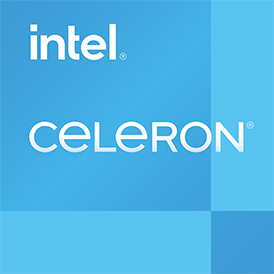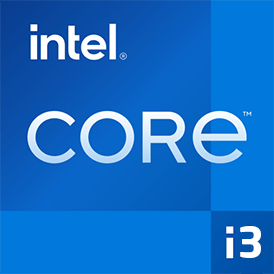
Intel Celeron J3455 vs Intel Core i3-7100U
Last updated:
CPU comparison with benchmarks

|
 |

|
| Intel Celeron J3455 | Intel Core i3-7100U | |
CPU comparisonIntel Celeron J3455 or Intel Core i3-7100U - which processor is faster? In this comparison we look at the differences and analyze which of these two CPUs is better. We compare the technical data and benchmark results.
The Intel Celeron J3455 has 4 cores with 4 threads and clocks with a maximum frequency of 2.30 GHz. Up to 8 GB of memory is supported in 2 memory channels. The Intel Celeron J3455 was released in Q3/2016. The Intel Core i3-7100U has 2 cores with 4 threads and clocks with a maximum frequency of 2.40 GHz. The CPU supports up to 32 GB of memory in 2 memory channels. The Intel Core i3-7100U was released in Q4/2016. |
||
| Intel Celeron (165) | Family | Intel Core i3 (205) |
| Intel Celeron J3000 (4) | CPU group | Intel Core i 7000U (18) |
| 7 | Generation | 7 |
| Apollo Lake | Architecture | Kaby Lake U |
| Mobile | Segment | Mobile |
| -- | Predecessor | Intel Core i3-6100U |
| -- | Successor | -- |
|
|
||
CPU Cores and Base FrequencyThe Intel Celeron J3455 is a 4 core processor with a clock frequency of 1.50 GHz (2.30 GHz). The Intel Core i3-7100U has 2 CPU cores with a clock frequency of 2.40 GHz. |
||
| Intel Celeron J3455 | Characteristic | Intel Core i3-7100U |
| 4 | Cores | 2 |
| 4 | Threads | 4 |
| normal | Core architecture | normal |
| No | Hyperthreading | Yes |
| No | Overclocking ? | No |
| 1.50 GHz | Frequency | 2.40 GHz |
| 2.30 GHz | Turbo Frequency (1 Core) | -- |
| 2.20 GHz | Turbo Frequency (All Cores) | -- |
Internal GraphicsThe integrated graphics unit of a processor is not only responsible for the pure image output on the system, but can also significantly increase the efficiency of the system with the support of modern video codecs. |
||
| Intel HD Graphics 500 | GPU | Intel HD Graphics 620 |
| 0.25 GHz | GPU frequency | 0.30 GHz |
| 0.75 GHz | GPU (Turbo) | 1.00 GHz |
| 9 | GPU Generation | 9.5 |
| 14 nm | Technology | 14 nm |
| 3 | Max. displays | 3 |
| 12 | Compute units | 24 |
| 96 | Shader | 192 |
| No | Hardware Raytracing | No |
| No | Frame Generation | No |
| 8 GB | Max. GPU Memory | 32 GB |
| 12 | DirectX Version | 12 |
Hardware codec supportA photo or video codec that is accelerated in hardware can greatly accelerate the working speed of a processor and extend the battery life of notebooks or smartphones when playing videos. |
||
| Intel HD Graphics 500 | GPU | Intel HD Graphics 620 |
| Decode / Encode | Codec h265 / HEVC (8 bit) | Decode / Encode |
| Decode | Codec h265 / HEVC (10 bit) | Decode / Encode |
| Decode / Encode | Codec h264 | Decode / Encode |
| Decode | Codec VP9 | Decode / Encode |
| Decode / Encode | Codec VP8 | Decode / Encode |
| No | Codec AV1 | No |
| Decode / Encode | Codec AVC | Decode / Encode |
| Decode | Codec VC-1 | Decode |
| Decode / Encode | Codec JPEG | Decode / Encode |
Memory & PCIeThe Intel Celeron J3455 supports a maximum of 8 GB of memory in 2 memory channels. The Intel Core i3-7100U can connect up to 32 GB of memory in 2 memory channels. |
||
| Intel Celeron J3455 | Characteristic | Intel Core i3-7100U |
| LPDDR4-2400, LPDDR3-1866, DDR3L-1866 | Memory | LPDDR3-1866, DDR4-2133 |
| 8 GB | Max. Memory | 32 GB |
| 2 (Dual Channel) | Memory channels | 2 (Dual Channel) |
| 29.9 GB/s | Max. Bandwidth | 34.1 GB/s |
| No | ECC | No |
| -- | L2 Cache | -- |
| 2.00 MB | L3 Cache | 3.00 MB |
| 2.0 | PCIe version | 3.0 |
| 6 | PCIe lanes | 12 |
| 3.0 GB/s | PCIe Bandwidth | 11.8 GB/s |
Thermal ManagementThe TDP (Thermal Design Power) of a processor specifies the required cooling solution. The Intel Celeron J3455 has a TDP of 10 W, that of the Intel Core i3-7100U is 15 W. |
||
| Intel Celeron J3455 | Characteristic | Intel Core i3-7100U |
| 10 W | TDP (PL1 / PBP) | 15 W |
| -- | TDP (PL2) | -- |
| -- | TDP up | -- |
| -- | TDP down | 7.5 W |
| 105 °C | Tjunction max. | 100 °C |
Technical detailsThe Intel Celeron J3455 has a 2.00 MB cache, while the Intel Core i3-7100U cache has a total of 3.00 MB. |
||
| Intel Celeron J3455 | Characteristic | Intel Core i3-7100U |
| 14 nm | Technology | 14 nm |
| Monolithic | Chip design | Monolithic |
| x86-64 (64 bit) | Instruction set (ISA) | x86-64 (64 bit) |
| SSE4.1, SSE4.2 | ISA extensions | SSE4.1, SSE4.2, AVX2 |
| BGA 1296 | Socket | BGA 1356 |
| VT-x, VT-x EPT, VT-d | Virtualization | VT-x, VT-x EPT, VT-d |
| Yes | AES-NI | Yes |
| Windows 10, Linux | Operating systems | Windows 10, Linux |
| Q3/2016 | Release date | Q4/2016 |
| 31 $ | Release price | 281 $ |
| show more data | show more data | |
Rate these processors
Average performance in benchmarks
⌀ Single core performance in 3 CPU benchmarks
⌀ Multi core performance in 4 CPU benchmarks
Geekbench 5, 64bit (Single-Core)
Geekbench 5 is a cross plattform benchmark that heavily uses the systems memory. A fast memory will push the result a lot. The single-core test only uses one CPU core, the amount of cores or hyperthreading ability doesn't count.
|
|
Intel Celeron J3455
4C 4T @ 2.30 GHz |
||
|
|
Intel Core i3-7100U
2C 4T @ 2.40 GHz |
||
Geekbench 5, 64bit (Multi-Core)
Geekbench 5 is a cross plattform benchmark that heavily uses the systems memory. A fast memory will push the result a lot. The multi-core test involves all CPU cores and taks a big advantage of hyperthreading.
|
|
Intel Celeron J3455
4C 4T @ 2.20 GHz |
||
|
|
Intel Core i3-7100U
2C 4T @ 2.40 GHz |
||
Geekbench 6 (Single-Core)
Geekbench 6 is a benchmark for modern computers, notebooks and smartphones. What is new is an optimized utilization of newer CPU architectures, e.g. based on the big.LITTLE concept and combining CPU cores of different sizes. The single-core benchmark only evaluates the performance of the fastest CPU core, the number of CPU cores in a processor is irrelevant here.
|
|
Intel Celeron J3455
4C 4T @ 2.30 GHz |
||
|
|
Intel Core i3-7100U
2C 4T @ 2.40 GHz |
||
Geekbench 6 (Multi-Core)
Geekbench 6 is a benchmark for modern computers, notebooks and smartphones. What is new is an optimized utilization of newer CPU architectures, e.g. based on the big.LITTLE concept and combining CPU cores of different sizes. The multi-core benchmark evaluates the performance of all of the processor's CPU cores. Virtual thread improvements such as AMD SMT or Intel's Hyper-Threading have a positive impact on the benchmark result.
|
|
Intel Celeron J3455
4C 4T @ 2.20 GHz |
||
|
|
Intel Core i3-7100U
2C 4T @ 2.40 GHz |
||
iGPU - FP32 Performance (Single-precision GFLOPS)
The theoretical computing performance of the internal graphics unit of the processor with simple accuracy (32 bit) in GFLOPS. GFLOPS indicates how many billion floating point operations the iGPU can perform per second.
|
|
Intel Celeron J3455
Intel HD Graphics 500 @ 0.75 GHz |
||
|
|
Intel Core i3-7100U
Intel HD Graphics 620 @ 1.00 GHz |
||
Estimated results for PassMark CPU Mark
Some of the CPUs listed below have been benchmarked by CPU-monkey. However the majority of CPUs have not been tested and the results have been estimated by a CPU-monkey’s secret proprietary formula. As such they do not accurately reflect the actual Passmark CPU mark values and are not endorsed by PassMark Software Pty Ltd.
|
|
Intel Celeron J3455
4C 4T @ 2.20 GHz |
||
|
|
Intel Core i3-7100U
2C 4T @ 2.40 GHz |
||
Cinebench R15 (Single-Core)
Cinebench R15 is the successor of Cinebench 11.5 and is also based on the Cinema 4 Suite. Cinema 4 is a worldwide used software to create 3D forms. The single-core test only uses one CPU core, the amount of cores or hyperthreading ability doesn't count.
|
|
Intel Celeron J3455
4C 4T @ 2.30 GHz |
||
|
|
Intel Core i3-7100U
2C 4T @ 2.40 GHz |
||
Cinebench R15 (Multi-Core)
Cinebench R15 is the successor of Cinebench 11.5 and is also based on the Cinema 4 Suite. Cinema 4 is a worldwide used software to create 3D forms. The multi-core test involves all CPU cores and taks a big advantage of hyperthreading.
|
|
Intel Celeron J3455
4C 4T @ 2.20 GHz |
||
|
|
Intel Core i3-7100U
2C 4T @ 2.40 GHz |
||
Cinebench R20 (Single-Core)
Cinebench R20 is the successor of Cinebench R15 and is also based on the Cinema 4 Suite. Cinema 4 is a worldwide used software to create 3D forms. The single-core test only uses one CPU core, the amount of cores or hyperthreading ability doesn't count.
|
|
Intel Celeron J3455
4C 4T @ 2.30 GHz |
||
|
|
Intel Core i3-7100U
2C 4T @ 2.40 GHz |
||
Cinebench R20 (Multi-Core)
Cinebench R20 is the successor of Cinebench R15 and is also based on the Cinema 4 Suite. Cinema 4 is a worldwide used software to create 3D forms. The multi-core test involves all CPU cores and taks a big advantage of hyperthreading.
|
|
Intel Celeron J3455
4C 4T @ 2.20 GHz |
||
|
|
Intel Core i3-7100U
2C 4T @ 2.40 GHz |
||
Blender 3.1 Benchmark
In the Blender Benchmark 3.1, the scenes "monster", "junkshop" and "classroom" are rendered and the time required by the system is measured. In our benchmark we test the CPU and not the graphics card. Blender 3.1 was presented as a standalone version in March 2022.
|
|
Intel Celeron J3455
4C 4T @ 2.20 GHz |
||
|
|
Intel Core i3-7100U
2C 4T @ 2.40 GHz |
||
CPU-Z Benchmark 17 (Multi-Core)
The CPU-Z benchmark measures a processor's performance by measuring the time it takes the system to complete all benchmark calculations. The faster the benchmark is completed, the higher the score.
|
|
Intel Celeron J3455
4C 4T @ 1.50 GHz |
||
|
|
Intel Core i3-7100U
2C 4T @ 2.40 GHz |
||
Devices using this processor |
|
| Intel Celeron J3455 | Intel Core i3-7100U |
| ASRock J3455-ITX Gigabyte GA-J3455N-D3H ASRock Beebox J3455 Intel NUC Kit NUC6CAYH Gigabyte Brix GB-BPCE-3455 TerraMaster J3455 |
Unknown |
Popular comparisons containing this CPUs
back to index








